Rabbi nudges Jews toward perfect world
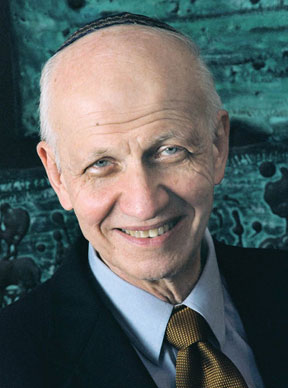 Rabbi Irving “Yitz” Greenberg, one of the American Jewish community’s foremost thinkers and leaders, will be here the weekend of Jan. 4-6 as the featured speaker of the Caviar Family Jewish Scholar in Residence Series at Kehilath Israel Synagogue. The weekend’s events are being co-sponsored by the Jewish Community Center and the Jewish Federation of Greater Kansas City.
Rabbi Irving “Yitz” Greenberg, one of the American Jewish community’s foremost thinkers and leaders, will be here the weekend of Jan. 4-6 as the featured speaker of the Caviar Family Jewish Scholar in Residence Series at Kehilath Israel Synagogue. The weekend’s events are being co-sponsored by the Jewish Community Center and the Jewish Federation of Greater Kansas City.
Rabbi Greenberg’s topics of discussion on Friday night and Saturday at K.I. will also pertain to the theme The Jewish Vision of a Perfect World. He will speak about the “The Challenges of a Changing Jewish World” at a Jewish Federation leadership seminar on Sunday. In a recent telephone interview, Rabbi Greenberg pointed out that both the Jewish vision of a perfect world and the challenges of a changing Jewish world are related.
He said the Jewish vision of a perfect world seems like a big topic, but the heart of it is fairly simple. As part of the explanation, he said most people think of Judaism’s impact on civilization as the recognition of one God. He would like to suggest Judaism has made another important impact.
“That’s the vision not just that there is a God who created the world, but the Jewish concept that it is God’s intention that this world be made perfect,” said the Orthodox ordained rabbi and scholar who earned a doctorate degree from Harvard.
Rabbi Greenberg explained that the image of a perfect world is often a Jewish messianic vision.
“What’s the definition of perfect? It really means a world filled with life, especially human life, which is the highest form of life. It’s God-like and according to the Bible, human beings are made in the image of God,” he said.
Rabbi Greenberg is currently the president of Jewish Life Network/Steinhardt Foundation. From 1974 through 1997, he served as founding President of CLAL — The National Jewish Center for Learning and Leadership, a pioneering institution in the development of adult and leadership education in the Jewish community and the leading organization in intra-Jewish dialogue and the work of Jewish unity. Before CLAL was founded, he served as rabbi of the Riverdale Jewish Center, as associate professor of history at Yeshiva University, and as founder, chairman and professor in the Department of Jewish Studies of City College of the City University of New York. He has also written several books.
To achieve a perfect world Rabbi Greenberg believes society should be structured so that the full dignity of human life should be upheld. Yet it hasn’t been that way for most people throughout much of history.
“You can’t fight city hall. You accept what’s out there as a given and for most people that is poverty and hunger and sickness, etcetera, etcetera,” he said.
But, he continued, that’s not really the Jewish vision.
“This God has made a covenant or a partnership with all humans. Jews are just one community but we would try to be role models or light unto nations. Therefore the Jewish vision is called tikkun olam, perfecting the world by a partnership between God and humanity and between the generations where each generation tries to improve the world both collectively and individually or at least tries to live your life that way,” Rabbi Greenberg said.
When he mentions tikkun olam, he stressed that the phrase, and that way of life, does not simply mean social justice.
“Half jokingly a lot of Conservative or traditional Jews complain that this is the left-wing of the Democratic party made into a sacred scripture, but it’s not,” he said.
Rabbi Greenberg explained that tikkun olam should be understood very broadly and it does involve social justice.
“It does involve taking care of the weak and the poor because they are also an image of God and they have the same dignity and equality as everyone else. But it also involves all acts that build the world to sustain life. So for example if someone creates a business or a factory that pays living wages that creates products … that upgrade the world … or develops medicines that cure people, that’s also tikkun olam,” he said.
“It shouldn’t be understood just as a left or a political position. I think it cuts across all these lines and that’s part of its greatness. It says whatever you want to do, whatever area of life you choose, you can live your life in a certain way that makes it part of tikkun olam.”
Todd Stettner, executive vice president and CEO of the Jewish Federation, noted that Rabbi Greenberg hasn’t made a presentation in Kansas City in more than a decade.
“Many of us who are now in leadership positions both lay and professional came into our positions listening to Yitz and hearing what he had to say about all sorts of issues impacting the Jewish community. He is certainly a major influence and I can’t say enough about his intellect. He’s an amazing man. He’s an Orthodox rabbi but he has flexibility and openness to all sides. He can really captivate an audience in a speech in a way not many people can,” Stettner said.
“You kind of hang on every word, he is just so smart,” he continued.
In Rabbi Greenberg’s association with the Jewish Life Network/Steinhardt Foundation, he has helped created many initiatives to enrich the inner life — religious, cultural and institutional — of American Jewry. He played a founder’s role in the creation of Birthright Israel, which gives the gift of a 10-day educational first trip to Israel to Jews ages 18 to 26 years old. When he discusses ways to draw young leaders into taking active roles in the Jewish community, he believes some of the things that attract young adults to Birthright and keep them connected to the Jewish community pertain here as well.
One of the things Jewish communities need to do, he said, is to make total Jewish environment experiences available, “so that you really experience what it means to live in a Jewish environment.” For adults it could be a simple retreat.
“It could be not just for a weekend. It could be a week. I think every Jewish family should be given a gift like we give for Birthright. You have a week or three days of living in a total Jewish community … so that from womb to tomb there is a set of experiences where Judaism is not just words or some obligation but it’s really living a very, very vital experience,” he said.
Now that Birthright has been in existence for 10 years, he said research shows that the trip doesn’t just give the participants a stronger connection to Israel, “which it does, but it gives them a stronger desire to be Jewish.” “They have lower intermarriage rates; they have higher participation rates in the community. Why is that? Because for the first time in their lives being Jewish is not something that their parents just talked about … it was a very exciting living experience,” he said.
For the Jewish community to succeed, and appeal to young Jews, Rabbi Greenberg said it must be open and friendly.
“Welcome people as they walk in the door at synagogue,” he suggested. “So you’ll know when you come to a Jewish activity you will be welcome, you will be noticed, you will be connected. There’s a lot going on that is exciting and enriching.”
Rabbi Irving Greenberg here Jan. 4-6
The theme of the Caviar Family Jewish Scholar in Residence Series at Kehilath Israel Synagogue featuring Rabbi Irving “Yitz” Greenberg is The Jewish Vision of a Perfect World.
The event Friday night begins at 5 p.m. with services at K.I. The rabbi will speak at 6 p.m., “Tikkun Olam & Tzelim Elokim: Repairing the World and Rediscovering the Divine Spark in Humanity.”
The rabbi will speak at approximately 10:30 a.m. Shabbat morning Jan. 6 (services begin at 9 a.m.). The topic will be “Covenant & Redemption.” Shabbat afternoon worship begins at 4:30 p.m., Rabbi Greenberg will discuss “The 12 Steps of Covenant for Healing the World” at approximately 5 p.m.
In honor of Rabbi Greenberg, all worship services will include a mechitzah.
On Sunday morning Jan. 6, Rabbi Greenberg will be the featured speaker at the Jewish Federation’s “Powering Our Future: The Challenges of a Changing Jewish World” leadership seminar from 10:30 a.m. to noon at the Jewish Community Campus. The community is welcome; however reservations are required. Call 913-327-8100 to RSVP.



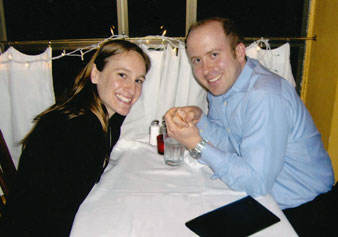 Every year on Dec. 24 about 200 young Jewish people in their 20s, 30s and 40s gather at a hot nightspot in the city to renew friendships and have an evening of good cheer. It’s not a singles event — couples and singles regularly attend — yet every now and then the relationship angels manage to bring two people together. That’s exactly what happened with Leah Karchin and Justin Unell at Bagel Bash 2009.
Every year on Dec. 24 about 200 young Jewish people in their 20s, 30s and 40s gather at a hot nightspot in the city to renew friendships and have an evening of good cheer. It’s not a singles event — couples and singles regularly attend — yet every now and then the relationship angels manage to bring two people together. That’s exactly what happened with Leah Karchin and Justin Unell at Bagel Bash 2009.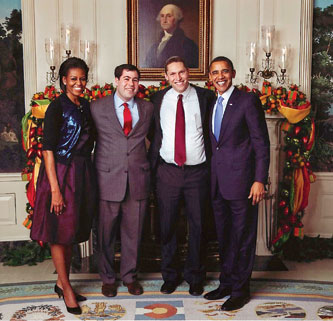
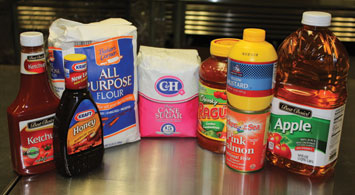 Many of us have stuffed ourselves during the past several days on latkes and brisket and other delicacies as we celebrated Chanukah. Some of us in the Jewish community are not fortunate enough to feel full during this holiday, or any other day.
Many of us have stuffed ourselves during the past several days on latkes and brisket and other delicacies as we celebrated Chanukah. Some of us in the Jewish community are not fortunate enough to feel full during this holiday, or any other day. Rabbi Shuval-Weiner and JFS’ Goldman, both vegetarians, learned quickly that it’s very hard to buy fresh fruits and vegetables on such a small budget.
Rabbi Shuval-Weiner and JFS’ Goldman, both vegetarians, learned quickly that it’s very hard to buy fresh fruits and vegetables on such a small budget.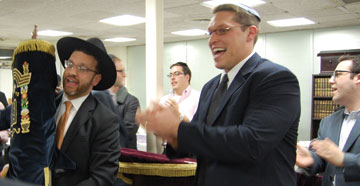 When Hurricane Sandy’s floodwaters immersed the Five Towns of Nassau County, they rose four feet high in the sanctuary of Congregation Ahavas Yisroel and soaked the four Torahs in the synagogue’s Aron Ha-Kodesh (ark) making them posul — not kosher. A synagogue without usable Torahs is like a school without teachers. Something had to be done.
When Hurricane Sandy’s floodwaters immersed the Five Towns of Nassau County, they rose four feet high in the sanctuary of Congregation Ahavas Yisroel and soaked the four Torahs in the synagogue’s Aron Ha-Kodesh (ark) making them posul — not kosher. A synagogue without usable Torahs is like a school without teachers. Something had to be done. When the curtain was raised on the Kansas City Ballet’s 40th annual production of “The Nutcracker” Dec. 1, audiences were treated to performances by several Jewish performers. At least five Jewish dancers are in the production, which has two casts for the young dancers. The Prince, one of the production’s major roles for students, is being played by Shawn Kramarovsky. Other Jewish performers include Stella Shapiro, siblings Greta and Oscar Miller and Natalie Goldman.
When the curtain was raised on the Kansas City Ballet’s 40th annual production of “The Nutcracker” Dec. 1, audiences were treated to performances by several Jewish performers. At least five Jewish dancers are in the production, which has two casts for the young dancers. The Prince, one of the production’s major roles for students, is being played by Shawn Kramarovsky. Other Jewish performers include Stella Shapiro, siblings Greta and Oscar Miller and Natalie Goldman. At age 7, Natalie Goldman is perhaps the youngest member of this year’s cast and has been dancing since she was in preschool at the Jewish Community Center. Now in second grade, she excitedly announces that she is in 11 performances of the ballet. The daughter of Stuart and Lauren Goldman, members of The Temple, Congregation B’nai Jehudah, she attends Stanley Elementary School. Ballet is her favorite activity.
At age 7, Natalie Goldman is perhaps the youngest member of this year’s cast and has been dancing since she was in preschool at the Jewish Community Center. Now in second grade, she excitedly announces that she is in 11 performances of the ballet. The daughter of Stuart and Lauren Goldman, members of The Temple, Congregation B’nai Jehudah, she attends Stanley Elementary School. Ballet is her favorite activity. Juggling school, rehearsals and performances, Stella said, is not as hard as people may think.
Juggling school, rehearsals and performances, Stella said, is not as hard as people may think. The sixth-grade student who belongs to Beth Shalom credits his early dancing success to good teachers at the KCBS, including Emily Simpson, the new director of the Kansas City Ballet, as well as Marcus Oatis. He’s also thrilled he gets to dance alongside the professionals.
The sixth-grade student who belongs to Beth Shalom credits his early dancing success to good teachers at the KCBS, including Emily Simpson, the new director of the Kansas City Ballet, as well as Marcus Oatis. He’s also thrilled he gets to dance alongside the professionals. Greta, who has been dancing for 11 years, always looks forward to “The Nutcracker.”
Greta, who has been dancing for 11 years, always looks forward to “The Nutcracker.”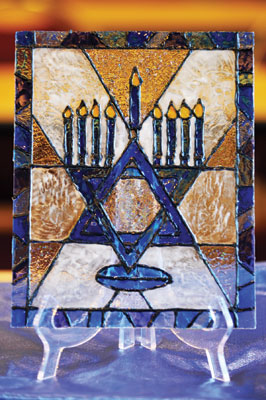 Sam Fine perfectly exemplifies the saying, “If at first you don’t succeed, try, try again.” Sam is the winner of the 16th annual Chanukah Art Contest sponsored by Chabad House Center and The Chronicle. Now a fifth-grade student at Prairie Star Elementary School, he’s entered the contest at least four times before winning this year’s grand prize — an iPad mini, complements of Chabad.
Sam Fine perfectly exemplifies the saying, “If at first you don’t succeed, try, try again.” Sam is the winner of the 16th annual Chanukah Art Contest sponsored by Chabad House Center and The Chronicle. Now a fifth-grade student at Prairie Star Elementary School, he’s entered the contest at least four times before winning this year’s grand prize — an iPad mini, complements of Chabad.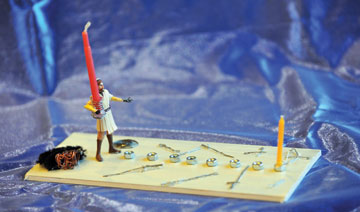 “Some entries reflected the beauty of the Chanukah lights, while others incorporated the Maccabee’s victory over the Greek army. One entry even incorporated today’s technology and connected it to the holiday. We wish we could give a grand prize to everyone who entered.”
“Some entries reflected the beauty of the Chanukah lights, while others incorporated the Maccabee’s victory over the Greek army. One entry even incorporated today’s technology and connected it to the holiday. We wish we could give a grand prize to everyone who entered.”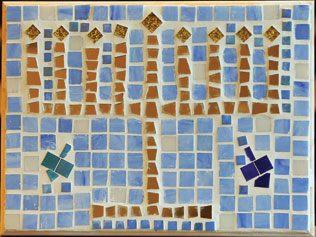 Sam chose to create a menorah because “it’s the most recognizable symbol of Chanukah.” He originally wanted to create a project made of stained glass, but his mother thought since he hadn’t worked with that medium before it could be a little too complicated for this contest entry. So he decided to do a window art project, which also hangs in a window allowing sun to shine through the colors and looks a lot like the more sophisticated stained glass.
Sam chose to create a menorah because “it’s the most recognizable symbol of Chanukah.” He originally wanted to create a project made of stained glass, but his mother thought since he hadn’t worked with that medium before it could be a little too complicated for this contest entry. So he decided to do a window art project, which also hangs in a window allowing sun to shine through the colors and looks a lot like the more sophisticated stained glass.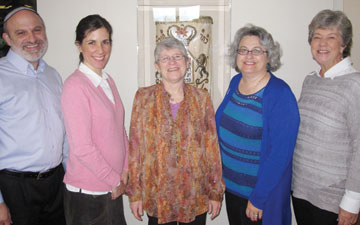
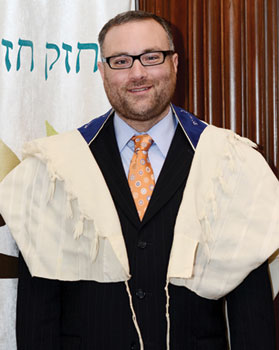 Rabbi David Glickman arrived here in July, during what was and continues to be a severe drought. Yet the situation is the exact opposite at Congregation Beth Shalom, where everything is blossoming and thriving under the young rabbi’s leadership.
Rabbi David Glickman arrived here in July, during what was and continues to be a severe drought. Yet the situation is the exact opposite at Congregation Beth Shalom, where everything is blossoming and thriving under the young rabbi’s leadership.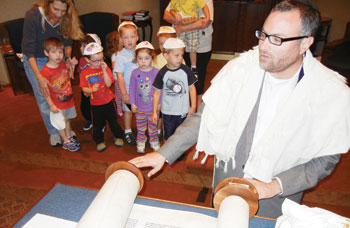 “I was very involved in Hillel and a number of different activities and specifically I was very involved in pro-Israel politics on campus. As passionate as I am about supporting Israel, I had a realization that without a Jewish people there would be no supporters of the state of Israel and I wanted to dedicate my life to helping build a thriving and flourishing Jewish people.
“I was very involved in Hillel and a number of different activities and specifically I was very involved in pro-Israel politics on campus. As passionate as I am about supporting Israel, I had a realization that without a Jewish people there would be no supporters of the state of Israel and I wanted to dedicate my life to helping build a thriving and flourishing Jewish people.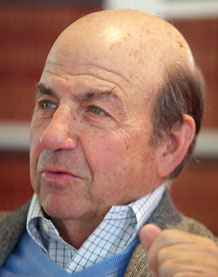 A hometown favorite is returning to Kansas City this weekend. Journalist and author Calvin Trillin will be at the Jewish Community Center on Sunday to promote his new book of “deadline poetry” about this year’s presidential election.
A hometown favorite is returning to Kansas City this weekend. Journalist and author Calvin Trillin will be at the Jewish Community Center on Sunday to promote his new book of “deadline poetry” about this year’s presidential election. Because of its subject, Trillin wanted to get the book out to readers as quickly as possible after the election. He turned in his final draft that Thursday. Because of his regular poetry gig at The Nation, he’s used to writing verse on a deadline.
Because of its subject, Trillin wanted to get the book out to readers as quickly as possible after the election. He turned in his final draft that Thursday. Because of his regular poetry gig at The Nation, he’s used to writing verse on a deadline.